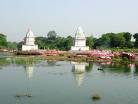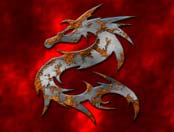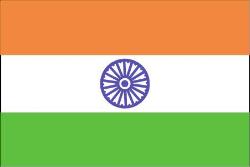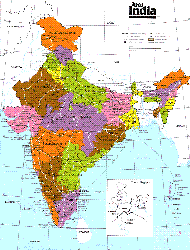do u like india
By muthamil
@muthamil (269)
India
23 responses
@connectajinkya (838)
• India
14 Nov 06
the country of god
the country of nice people
the country of nature
the country of lover
the country of helpers
the country of frnds
the country of clevers
the country of sanskriti
the country of unity
the country of culture
i love my india.
2 people like this
@hawkraj66 (77)
• India
14 Nov 06
YES I LOVE INDIA n I'm PROUD TO BE AN INDIAN:-)
Here are a few things abt INDIA
History
Main article: History of India
Stone Age rock shelters with paintings at Bhimbetka in the state of Madhya Pradesh are the earliest known traces of human life in India. The first known permanent settlements appeared over 9,000 years ago and gradually developed into the Indus Valley Civilization, dating back to 3300 BCE in western India. It was followed by the Vedic Civilization which laid the foundations of Hinduism and other cultural aspects of early Indian society. From around 550 BCE, many independent kingdoms and republics known as the Mahajanapadas were established across the country laying the foundations of ancient India.
The empire built by the Maurya dynasty under Emperor Ashoka the Great united most of modern Southern Asia except the Dravidian kingdoms in the south and laid the first foundation of a united subcontinental territory. From 180 BCE, a series of invasions from Central Asia into the north-western Indian Subcontinent followed, including the Indo-Greeks, Indo-Scythians, Indo-Parthians and the Kushans. From the third century CE, the Gupta dynasty oversaw the period referred to as ancient India's "Golden Age." While the north had larger, fewer kingdoms, in the south there were several dynasties such as the Chalukyas, Rashtrakutas, Hoysalas, Cheras, Cholas, Pallavas and Pandyas in different times and regions. The political influence of these mighty southern kingdoms, though felt to a lesser extent by north India, extended into Southeast Asia and Sri Lanka and deeply influenced their culture. The southern kingdoms remained relatively more stable and carried out maritime trade in spices and precious gems with the Arabia, China and Europe from ancient times. Science, engineering, art, literature, mathematics, astronomy, religion and philosophy flourished under the patronage of these kings.
Following the invasions from Central Asia, between the tenth to the twelfth centuries, much of north India came under the rule of the Delhi Sultanate, and later the Mughal dynasty, who gradually expanded their reign through most of the Indian subcontinent. Nevertheless, several indigenous kingdoms flourished,in the west and the south, such as the Maratha Empire and Vijayanagara Empire. From the sixteenth century onwards, several European countries, including Portugal, Netherlands, France and the United Kingdom, started arriving as traders, and attempted to establish colonies in the subcontinent, taking advantage of the fractious nature of relations between thousands of kingdoms. At the Battle of Plassey in 1757, the British East India Company defeated the local ruler Siraj-ud-Dawla and was given Bengal. Overtaxation by the British resulted in the Famine of 1770. The East India Company began wars of conquest and captured vast tracts of land in Punjab, Avadh (in modern Uttar Pradesh), Mysore (in modern Karnataka), and conquered nearly half of the land of the Indian subcontinent. The British also began implementing social changes, such as the legal abolition of Sati, due to the cumulative efforts of Lord William Bentinck, the Christian evangelists, the British utilitarians, Raja Rammohun Roy, and the Brahmo Samaj,[16][17]and instituting Western education on a limited scale. In 1857,a nationwide insurrection of rebelling military units and kingdoms, known as the Rebellion of 1857 broke out. Many Indian text-books term this rebellion as "The First War of Indian Independence". This shook the British East India Company, and caused the Queen in Great Britain to assume power and cease any further conquest of territory. After this point, there remained myriad rulers of small territories, called princely states, which existed as British protectorates. A western-style bureaucracy was raised with trained Indian people. It was during this time that the railways, telegraph and posts, military camps (cantonments) western-style educational institutes, and other industries were established. By this time the British realized that all these territories could be directly brought under the direct control of their empire. However, both the World Wars weakened Britain. The Indian freedom movement reached a crescendo between the wars when a unified territory allowed intensification of the movement, culminating into the forging of a large powerful democratic nation.
By the early twentieth century, a nationwide movement for social reforms, expulsion of the British, and full native governance was launched by the Indian National Congress, and various revolutionary groups. The movement was largely led by Mahatma Gandhi, with Maulana Azad, Gopal Krishna Gokhale, Lala Lajpat Rai, Bal Gangadhar Tilak, Sardar Vallabhbhai Patel, Jawaharlal Nehru, Bipin Chandra Pal and Subhash Chandra Bose playing important roles. Millions protested in various mass campaigns of civil disobedience where a very prominent philosophy was of ahimsa or non-violence. There were also numerous armed attempts by the likes of the Bhagat Singh, Udham Singh, Sukhdev, Rajguru, Kshudiram Das, Benoy, Badal and Dinesh, and an army of Indian soldiers under Netaji Subhash Chandra Bose used revolutionary or military means to rid India of the British. Finally, after the Quit India movement during WWII and a number of mutinies in the armed forces after the war, the British colonial authority ended with the emergence of India as a modern secular democratic nation-state on 15 August 1947. This period also sowed the seeds of another nation - Pakistan, and after a blood-stained partition, the Muslim majority regions were carved out to form Pakistan with its two wings separated by thousands of miles of Indian territory. Three years later, on 26 January 1950, India ratified a new Constitution, and became a republic. Modern India thus emerged as a amalgamation of western democracy while preserving its ancient heritage laid in its first foundation in 321 BCE during Emperor Ashoka's Mauryan Empire.
Since winning independence from Britain in 1947 and becoming a modern nation-state, India has seen numerous insurgencies in various parts of the country. However, it has addressed the regional aspirations and successfully maintained its unity and democratic structure. It continues to have unresolved border disputes with China, which escalated into the brief Sino-Indian War in 1962; and with Pakistan, which resulted in wars in 1947, 1965, 1971 and in 1999 war in Kargil. The 1971 war (Bangladesh Liberation War), caused by flow of millions of East Pakistan refugees into India resulted in the break-up of Pakistan and the independence of Bangladesh. India is a founding member of the Non-Aligned Movement and the United Nations (at the time as part of British India). In 1974, India conducted an underground nuclear test. This was followed by five more tests in 1998. Significant economic reforms beginning in 1991 have transformed India into one of the fastest-growing economies in the world.
Government
Main article: Government of India
India is referred to as the largest democracy in the world, by virtue of the fact that it has the largest electing population among democratic countries. The country has a unitary form of government and a bicameral parliament operating under a Westminster-style parliamentary system. It has three branches of governance: the Legislature, Executive and Judiciary. The President is the head of state, though he has a largely ceremonial role. He is also the Supreme Commander of India's armed forces. The President is elected indirectly by an electoral college for five-year terms. Presidential assent is needed for a Bill or Ordinance passed by the Parliament to come into force. The Prime Minister is the de facto head of government, and has most executive powers. He or she is appointed by the President, with the requirement that he or she enjoy the support of the party or coalition having more than 50% seats in the lower house. The Union Council of Ministers headed by the Prime Minister aids and advises the President on governance matters.
The legislature of India is the bicameral Parliament, which consists of the upper house called the Rajya Sabha (Council of States), and the lower house called the Lok Sabha (House of People). The 245-member Rajya Sabha is chosen indirectly through the state Legislative Assemblies, and has a staggered six-year term. Each state sends members to the Rajya Sabha in a proportion of its population. The 545-member Lok Sabha is directly elected (Some seats are reserved for the erstwhile lower castes) by popular vote for a five-year term (except two nominated Anglo-Indian members), and is the determinative constituent of political power and government formation. Universal adulthood suffrage is guaranteed by the Constitution for citizens above 18 years of age. The executive arm consists of the President, Vice-President, and the Council of Ministers (the Cabinet being its executive committee) headed by the Prime Minister. Any minister holding a portfolio must be a member of either house of parliament. In the Indian parliamentary system, the executive is subordinate to the legislature.
India's independent judiciary consists of the Supreme Court, headed by the Chief Justice of India. The Supreme Court has both original jurisdiction over disputes between states and the Centre, and appellate jurisdiction over the eighteen High Courts of India, and additionally, the power to declare Union and state laws null and void if in conflict with the Constitution.[18]POLITICS:
From 1947 to 1974 India was ruled by the Indian National Congress, the party most closely associated with the country's freedom struggle. In 1977 the Janata Party formed the first non-congress government by winning a historic election riding on public discontent during the "Emergency" declared by the Congress Prime Minister Indira Gandhi. The Congress stormed back to power in 1980 and ruled again till
@SViswan (12051)
• India
14 Nov 06
I love India..especially since I am Indian who grew up abroad and has been here only on vacation. Now I have settled in India.
There are certain aspects of India that I do not like though...the fact that people don't seem to think twice about spitting in public and throwing trash all along the roads and stuff like that.
On the whole I do believe that India has the potental to really be one of the top countries only if the politicians were not so corrupt and people were more responsible.
@niranjans87 (1077)
• India
14 Nov 06
Yup..I love India...I am proud to be an INDIAN :)
2 people like this


























